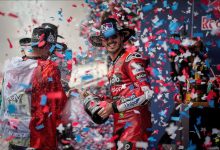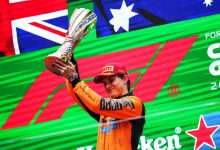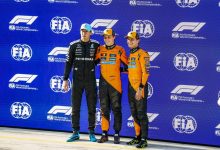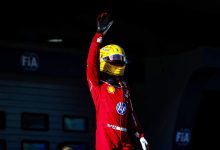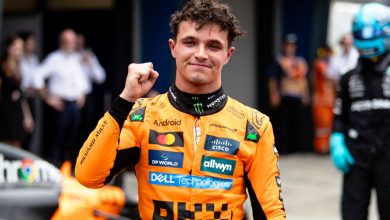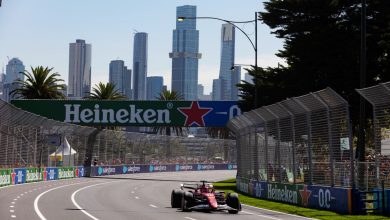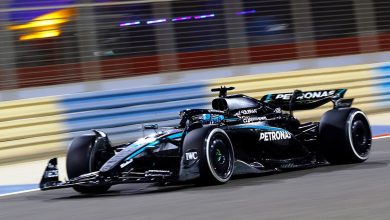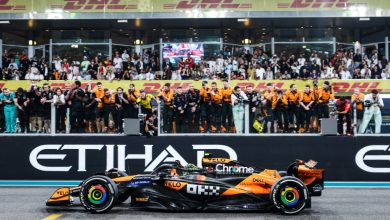It is a pleasure to debut and race in front of home crowd: Sergey Sirotkin
DRIVERS – Valtteri BOTTAS (Mercedes), Marcus Ericsson (Sauber), Sergey SIROTKIN (Williams), Charles LECLERC (Sauber)
PRESS CONFERENCE
Q: Marcus, Sauber announced this week that Antonio Giovinazzi will be racing next season but you’re going to be remaining with the team in 2019, so just give us your reaction to the news about what’s happening next year.
Marcus ERICSSON: Yeah, it’s obviously disappointing to be not racing. It’s all you want to do; you want to race. It’s not good news for me, obviously. Still, I’m happy to be able to continue my relationship with the team but then yeah, let’s see. I want to race still, so I’m looking at different options on how to keep doing that and looking at everything really, what I can do, in what series and what it could be – but it’s still a bit early. It’s quite fresh, this news, so I need to look at my options. Overall, of course, I would like to stay.
Q: You said on social media ‘it’s not the end of the story – just the start of a new chapter’ but does it feel like it’s the end of the Formula One chapter, in your eyes?
ME: No. My goal is still to come back into Formula One. I think for 2019 that’s not going to happen but hopefully after that there will be possibilities to come back. That’s still the goal, to come back to Formula One.
Q: Sergey, moving onto you next. You raced here in what was GP2 but this will be your first Russian Grand Prix as a Formula One driver – so it must be a special weekend for you.
Sergey SIROTKIN: It is. It’s going to be special, for sure. Obviously being here almost every year, since F1 came here, I raced here in GP2 but it’s all quite different from being here as a race Formula One Driver. I can feel it already now, it’s a lot of attention, a lot of support, which is very nice to feel as a driver, it’s very nice to feel especially in the situation we are this year. I mean, it’s a lot more activity, it’s a bit of… y’know… I would say it’s a bit more difficult to manage all of that but I mean, I try to get the best from it, I try to get energy from it and keep going. So, it is a pleasure to be here and race in front of the home crowd.
Q: That’s the specifics of this weekend – but more generally, do you know what you’ll be doing in 2019 yet?
SS: I definitely know what I want to be doing. I’m not sure I can guarantee something right here, right now, but, I mean, I think it’s quite obvious, with the way everything is developing, I think it’s quite obvious what I want and it’s something that should happen quite soon. Yeah, I have no guarantees right now, right here, but at the same time I’m not too much worried about the future, let’s say.
Q: Valtteri, this will be Sergey’s first grand prix here in Formula One and this was the scene of your first Formula One victory for Mercedes last year – so does it bring back special memories, returning to Sochi?
Valtteri BOTTAS: Definitely. You never forget the first time. It was a good memory and it will be nice to be back here. Strong track normally. I’ve had pretty decent races so in that way it’s a nice approach to the weekend.
Q: You had more wins after this win here during last season but 2017 was the last time you won a grand prix. How do you go about turning that around this weekend?
VB: No wins for me this year yet but there’s still a bit of the season left and I come here with only one thing on my mind and that is being on the pole and winning the race.
Q: Charles, you’ve a few weeks now to digest where you’ll be racing next year, and you called it a dream come true, to be moving teams. Can we ask, in those dreams, have you started thinking about your first grand prix victory yet?
Charles LECLERC: No, not yet, it’s still very far away. First of all, I have to finish this season on a high, which is for now the main importance to me. There are still six races to go, so I’ll first try to focus on that. Obviously, it’s a dream come true to be racing for Ferrari next year – but I’m trying to take it out of my mind to focus fully on the end of this season.
Q: Focussing on that then, what is it you want to do with Sauber in these final six races. What are the things you still need to learn and work on ahead of your move?
CL: I think you can always improve. To learn, I still think I can learn in everything. So there is still a lot to learn. The target for the end of the season is to try to keep our form. It’s not going to be easy, because, as the team already mentioned, we started to focus, or the team started to focus, on next year’s car and I believe some of the other teams are still pushing a little bit to gain some positions in the championship – so it’s not an easy situation to be in, but we will try to keep our form.
QUESTIONS FROM THE FLOOR
Q: (Scott Mitchell – Autosport) Question for Marcus. The confirmation that you would be reserve driver obviously followed pretty immediately after Sauber confirmed its driver lineup. So, it’s not like you had to face speculation in public about what you would be doing or if you would drive for another team. So, how much notice did you get have? How aware were you that was coming? And did you have much opportunity to look at maybe Williams for next year or staying in F1 in a race role?
ME: I think when Kimi signed, I think that was bad news for me. I was still hoping but then obviously over the past weekend I got the information that Antonio had signed for the other car. And then yeah, my management were looking around a little bit but we decided to continue with Sauber and the relationship there, which we think is important. And then yeah, we go from there basically.
Q: (Andrey Kirsanov – Sputnik News Agency) My question is to Sergey Sirotkin, to our champion. As you know, the last edition of Formula 1 in Singapore, Lewis Hamilton from Mercedes, he won this edition. So what are your expectations for this edition in Sochi, how are you preparing and who are your main rivals in this time?
SS: Tricky question because everybody speaks that we are coming here to Sochi and that it should be a special event and so on and so on, but at the end of the day, in terms of preparation, how you build up your weekend, how you prepare yourself and how you do all your work with the team, it doesn’t really change much at all. It doesn’t matter if you go to Sochi or you go wherever else, every time you try to do your job, you try to do it as good as you can. If I could do anything better than I could I would do it a long time ago, I wouldn’t wait for here. So, I wouldn’t say there is anything different. I wouldn’t say anything different in terms of our opponents or whatever. So yeah, again we just try to do the best from where we are and maximise the situation and I’m afraid that’s it.
And your main rivals?
SS: It’s exactly the same as any other single race. First of all I think we should look at ourselves because I think it’s that type of track where we can have surprises, in both ways, in a good way and in bad way, and depending on that it will put us either closer or further away from the teams we want to be fighting with, so it’s quite difficult to say. But there’s not much movement around the field now anyway, so I would say nothing is going to be much different from what we saw in, let’s say, the recent three, four or five races.
Q: (Valery Kartashev – Racing News Agency) My question is to everybody. In Singapore, Lewis Hamilton said his passion for music and the fashion industry helps him to stay motivated, so my question is: do you have something outside Formula 1 that helps you to stay motivated and recharge the batteries?
VB: Yeah, I think everyone definitely has some things they have time to do between the races. I think for me personally it’s been always… I love sports. It’s a way of staying healthy and a way of getting rid of stress that we can experience with this sport. If I have free time, which I didn’t really have since the last race, but if I have, it’s nice to see the family, friends that you don’t normally get to see. Personally, I love nature, so sometimes a proper escape to hiking or some mountains or something is nice.
ME: Yeah, I’m a bit the same like Valtteri. I enjoy sports in general. I recently opened a paddle centre, so I play quite a lot of that with my friend. I enjoy that a lot. And then, I’m an ice hockey freak, so I watch a lot of ice hockey.
CL: First of all, what motivates me is the results. To me, it’s just trying to work as hard as possible to get the best result possible then on track. Then what relaxes me is just staying with the family and friends in Monaco. Nothing special to be honest.
SS: I would repeat what Valtteri says. I mean most of my life is anyway dedicated to the cars, so anything related to that – I’m never really going far away from it. Again, some type of training. I do like also to stay with the family, to go to see some nature, to be as switched off as possible at certain points from racing. So nothing really much unusual I would say.
Q: (Livio Oricchio – Globoesporte.com) To all drivers, I start with Valtteri. You started third position and you became first before… at the end of the straight you got a good two from Sebastian, overtook him. And we saw this year also, Sebastian starting behind Lewis in Spa, the same situation; he overtook him after the starting grid and a long straight. Circuits like this, it’s interesting to maybe start from second position or even third rather than pole position?
VB: Yeah, it is tricky one here. It is an extremely long run into Turn 2. Last year I missed the pole by, I think, less than one tenth, which maybe in the end was good, I got a nice tow. But you also need a good start for that. I think still you would like to be on pole because from pole if you get a good start there is… I think if you look at the past, 2015 and 2016, who started on pole could keep the first place into Turn 2. It is a tricky one. Now I think there is a bit of resurfacing done, which affects position one and two. Normally when there is new tarmac it means there is more grip so potentially you would like to be in the first two places.
Marcus, you’ve raced here before, is this a circuit you can make big gains at into Turn 2?
ME: Yeah, I think when it’s a long run into the first braking zone, it’s obviously important with a good start but then you need to look for a good tow, especially these days with the heavy downforce cars, it can make a difference. But as Valtteri says, you still need a good start, to get the momentum on the people around you. But it definitely opens up a bit of a mixture of positions, because it’s such a long run, you know. Some other tracks, like Singapore, even if you do it a good start it’s difficult to make up from it, but here it can really make a difference and you can gain quite a lot of positions.
Charles, it will be the first time you race here, so is this something you look at when you come to a new circuit?
CL: Yeah, you do, but it’s quite difficult to speak when you don’t know the track. Starts haven’t been my strong point this year; I think I struggled quite a bit. But to know there’s a long straight will for sure help overtakes after the start, but apart from that I don’t really know what to say. I don’t know this track so…
Sergey, did you have a similar experience in GP2?
SS: I don’t really remember how it was in GP2, but for sure this kind of track, the speed you approach Turn 2 for the braking and the speed you actually want to brake down to for the apex, it’s quite a big offset, so you can still do something. But again, it all should start with a good launch initially. Without that, it doesn’t matter how long is the straight you won’t really be able to do much.
Q: (Scott Mitchell – Autosport) In Singapore we had blue flags as a topic in the race and afterward. It seems to have a split opinion on their merit in Formula One. What are your respective thoughts on blue flags? Should they be dropped or do they still have a place? Could it be implemented differently? What do you think?
SS: Firstly, I don’t think I’ve ever experienced it as the leading car, obviously, so I can imagine that for the leaders it’s as painful as it is for us. It’s one story when you’re just finishing your race and you’re not really fighting but there are some other occasions when we’re still fighting for positions and for us it’s quite painful to find a good safe way for ourselves, first of all, to let the leading cars pass by. Honestly, I don’t think I have the best experienced to comment if I wish to keep that or if I wish to get rid of it but yeah…
CL: Well, in Singapore first of all, I would like to thank Sergey because if my strategy worked that well it’s thanks to him also.
SS: It was a pleasure.
CL: I think if it’s done well, it’s the right thing to have in Formula One but then in Singapore, it was a bit of a mess, I think. At one point, the marshals were waving yellow flags at me for several laps but I had nobody behind or more than one second or quite a lot more, actually. If it’s done properly I think it should stay but we just need to fix this issue for next year in Singapore.
ME: I think it’s always difficult with the blue flags and there are always arguments between the top cars compared to the guys they are lapping and it’s always two opinions there. I think we’ve tried 1.5 seconds, we’ve been down to one second and now I think it’s 1.2s. It’s difficult to find the perfect solution. I think it changes from track to track. In my opinion, I think 1.2s is a good compromise. It’s never going to be perfect, but I think it’s just part of the sport, part of the race and I think as it is now I think is the best solution in my opinion, that’s the most fair for both the top and the guys who are getting lapped as well. I can also understand the frustration in the case of Valtteri in Singapore, obviously, because it’s a track where it’s very difficult to get close enough but at the same the guys who they are lapping are also having a race and fighting for points so it is a very difficult subject but I think where it is now is a good compromise.
VB: Well yes, first of all I’m definitely happy to keep the blue flags. I’ve been on both sides, really. I’ve been blue-flagged many times as well. I think honestly, as Marcus says, it really depends on different tracks. Sometimes this new 1.2s rule is good and sometimes it’s a bit tricky to get close enough to trigger the blue flags, like what happened to me in Singapore but it is also going to be a compromise, it’s never going to be perfect. In the end, for all the lead cars lapping, it is the same. Sometimes you get more luck with it, sometimes more unlucky and that’s how it goes. For now it’s fine.
Q: (Frederic Ferret – L’Equipe) Sergey, what are your thoughts on the recent success of Russian drivers you met before, in two years’ time in the Formula One paddock? Is it a question of growing motor racing culture in your country or the chance to have big companies to support you?
SS: I think it’s a good question. I think it’s a bit of both generally, the racing getting more and more popular which obviously gives more chances, initially, for the drivers first of all, more like a base and I think we will see it even more in the future. Same for the companies: there are more and more companies and different organisations and so on starting to be interested in supporting the racing, whatever it could be. It could be drivers’ sponsorship, it could be like that here. Many companies supporting the track activity here in Sochi or other things similar in Moscow or whatever. Yeah, there’s definitely a lot more movement around this sport nowadays than there’s been, even when I started so it’s a good way to keep going and to improve it. I think it’s still just beginning and I think what’s going on on the base what we have today is going to come in quite a few years and I think it will be quite an impressive improvement.
